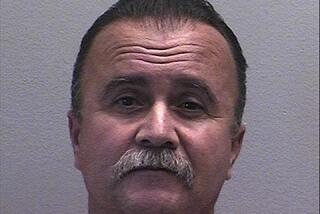Trial of Landlady in Serial Killings Nears End : Courts: Prosecutors say Dorothea Puente killed down-and-out tenants and buried them in her garden. Deliberations on nine murder counts could start today.
- Share via
MONTEREY — Dorothea Montalvo Puente might seem like “a grandmotherly figure,” says prosecutor John O’Mara. But in reality, he contends, she is the nation’s most prolific female serial murderer ever, “a cold, calculating” killer of tenants at her Sacramento boardinghouse.
Puente befriended the homeless and mentally disabled, won their trust and then killed them for their money, burying their bodies in her garden, the prosecution charged last week as Puente’s marathon trial on nine murder charges neared a close.
“The irony of ironies is that these people made it through all kinds of things,” O’Mara told the jury. “They go to this island of peace--this warm, wonderful woman who takes in alcoholics and other homeless people and gives them new life--and most of them don’t live out the month.”
After five months of testimony, 153 witnesses and 3,500 exhibits, the jury could begin deliberations as early as today on the fate of the Sacramento landlady who allegedly drugged her elderly tenants and buried them in her yard.
Puente, 64, was arrested in 1988 in Los Angeles, where she fled after the decomposed bodies of seven of her tenants were unearthed from the yard of her Victorian house. Subsequent investigation linked her to two additional deaths, authorities say.
Prosecutors contend that Puente received about $87,000 by cashing the disability and Social Security checks of her victims, spending the money on a face lift, among other things.
Puente’s defense maintains she is the victim of “a witch hunt.” Her lawyers say she may be guilty of forging and cashing the checks of her dead tenants but that she never murdered anyone.
They contend that all nine of the deaths, dating from 1982 to 1988, were either natural or accidental. Puente buried her dead tenants in the yard because she did not want to alert authorities to the fact that she was running a boardinghouse in violation of her parole, defense attorneys say.
At the time, Puente was on parole for drugging elderly people and cashing their disability and Social Security checks.
The defense is scheduled to give its closing arguments today. The trial was moved to Monterey County Superior Court because of extensive pretrial publicity in Sacramento.
The white-haired Puente went to considerable lengths to woo her victims, prosecutors charged. They said she befriended people who were on government assistance and had no relatives nearby, gave them a home and bought them special clothes and furniture.
Although she may look the part of a grandmother, O’Mara told the jury, “she is not Mary See of See’s Candies.”
In four days of closing arguments, he sought to highlight the viciousness of Puente’s alleged crimes, contending that she dismembered the body of one victim, 78-year-old Betty Mae Palmer, before burying the torso beneath a religious shrine in the front yard. Palmer’s head, arms and lower legs have never been found.
O’Mara also cited the case of Everson Gillmouth, a 77-year-old Oregon man who hoped to marry Puente after she was released from prison in 1985. His body was found four months later in a makeshift coffin by the Sacramento River.
“This is a man that she supposedly had some feeling for,” the prosecutor told the jury. “He was unceremoniously dumped beside the Sacramento River. Most of you even treat your pets better than that.”
There are no eyewitnesses to any of the fatalities, and eight of the nine bodies were so decomposed that coroners listed the cause of death as “undetermined.”
But through high-tech forensic toxicology, the prosecution has sought to prove that the seven people buried in the garden ingested the sleeping pill Dalmane shortly before death. Puente repeatedly refilled prescriptions for the drug.
Although Puente never took the witness stand in her defense, a videotaped conversation with police--which was played for the jury--may have provided damaging evidence against her.
When bodies were first discovered in her yard, she told investigators that two of her missing tenants were in Utah and Marysville, Calif. Their bodies were soon exhumed from the garden.
At one point during the interview, the detective bluffed: “Dorothea, I know if we dig, we’re going to find more.”
“Well, I didn’t put them there,” Puente replied. “I couldn’t drag a body anyplace.”
More to Read
Sign up for Essential California
The most important California stories and recommendations in your inbox every morning.
You may occasionally receive promotional content from the Los Angeles Times.











